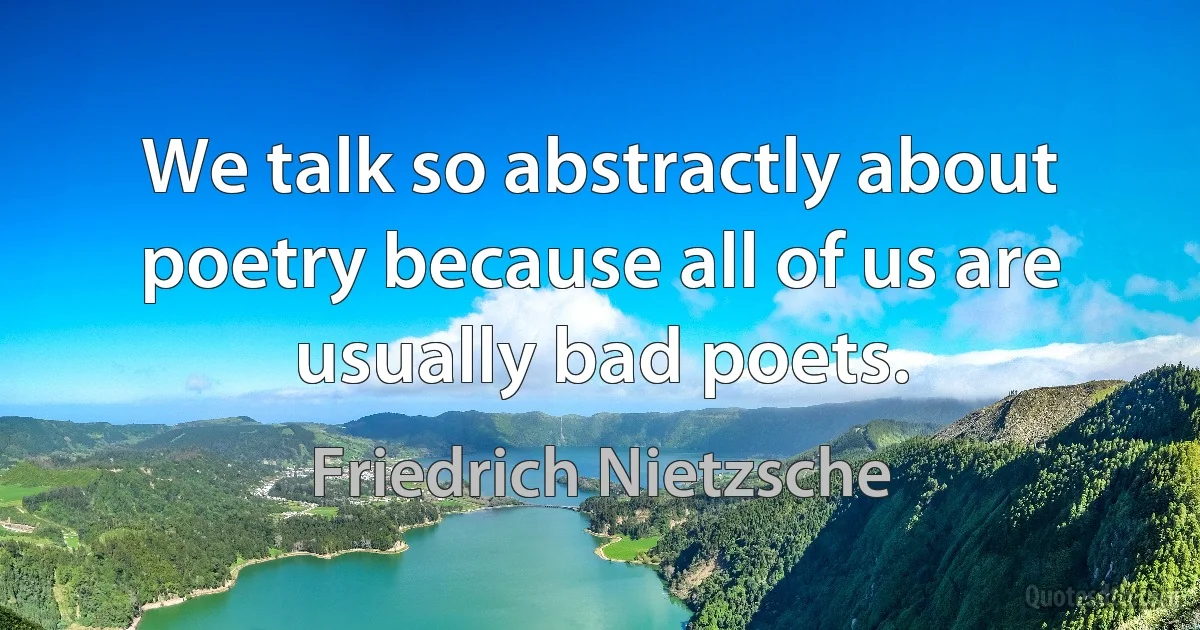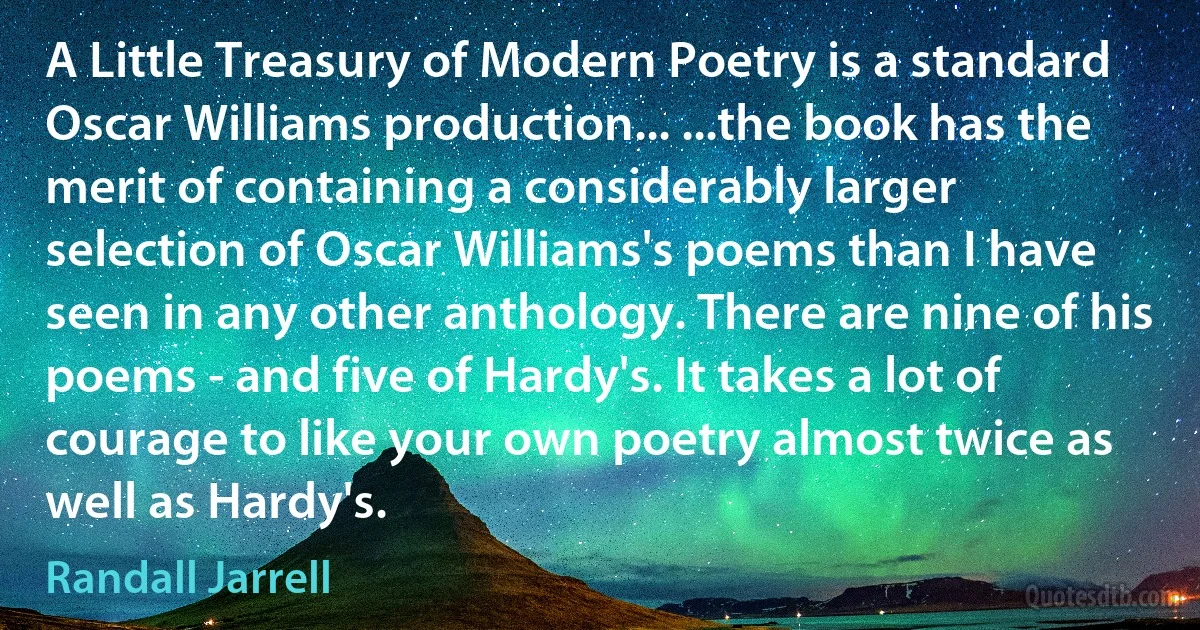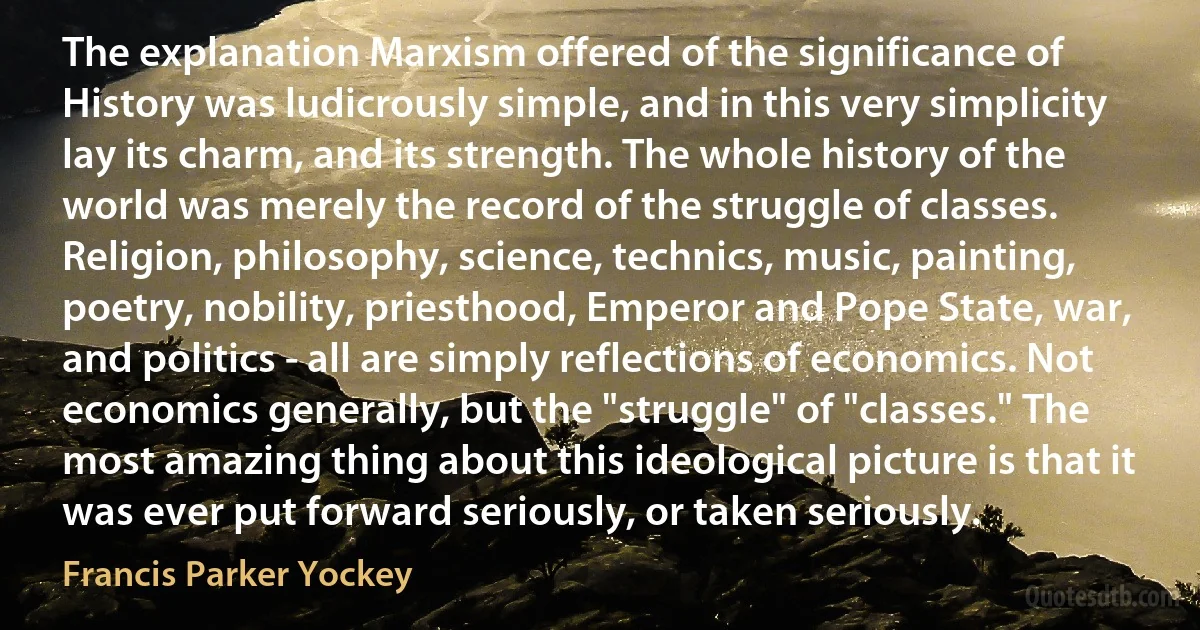Poetry Quotes - page 94
In this way, a philosophy which veiled the Philistine confessions of its founder beneath neat twists and flourishes of language proceeded further to discover a formula for the canonization of the commonplace. It expatiated upon the rationalism of all reality, and thus ingratiated itself with the Culture-Philistine, who also loves neat twists and flourishes, and who, above all, considers himself real, and regards his reality as the standard of reason for the world. From this time forward he began to allow every one, and even himself, to reflect, to investigate, to aestheticise, and, more particularly, to make poetry, music, and even pictures-not to mention systems of philosophy; provided, of course, that ... no assault were made upon the "reasonable” and the "real”-that is to say, upon the Philistine.

Friedrich Nietzsche
Greek tragedy met her death in a different way from all the older sister arts: she died tragically by her own hand, after irresolvable conflicts, while the others died happy and peaceful at an advanced age. If a painless death, leaving behind beautiful progeny, is the sign of a happy natural state, then the endings of the other arts show us the example of just such a happy natural state: they sink slowly, and with their dying eyes they behold their fairer offspring, who lift up their heads in bold impatience. The death of Greek tragedy, on the other hand, left a great void whose effects were felt profoundly, far and wide; as once Greek sailors in Tiberius' time heard the distressing cry 'the god Pan is dead' issuing from a lonely island, now, throughout the Hellenic world, this cry resounded like an agonized lament: 'Tragedy is dead! Poetry itself died with it! Away, away with you, puny, stunted imitators! Away with you to Hades, and eat your fill of the old masters' crumbs!'

Friedrich Nietzsche
After a while one is embarrassed not so much for them as for poetry, which is for these poor poets one more of the openings against which everyone in the end beats his brains out; and one finds it unbearable that poetry should be so hard to write - a game of Pin the Tail on the Donkey in which there is for most of the players no tail, no donkey, not even a booby prize.

Randall Jarrell
When I was asked to talk about the Obscurity of the Modern Poet I was delighted, for I have suffered from this obscurity all my life. But then I realized that I was being asked to talk not about the fact that people don't read poetry, but about the fact that most of them wouldn't understand it if they did: about the difficulty, not the neglect, of contemporary poetry.

Randall Jarrell
Poetry is a bad medium for philosophy. Everything in the philosophical poem has to satisfy irreconcilable requirements: for instance, the last demand that we should make of philosophy (that it be interesting) is the first we make of a poem; the philosophical poet has an elevated and methodical, but forlorn and absurd air as he works away at his flying tank, his sewing-machine that also plays the piano.

Randall Jarrell
Today's Real Man is probably closest to Spencer Tracy or Gary Cooper in spirit; he realizes that while birds, flowers, poetry, and small children do not add to the quality of life in quite the same manner as a Super Bowl and six-pack of Budweiser, he's learned to appreciate them anyway.

Bruce Feirstein
The poetry of Dante may be considered as the bridge thrown over the stream of time, which unites the modern and ancient world. The distorted notions of invisible things which Dante and his rival Milton have idealized, are merely the mask and the mantle in which these great poets walk through eternity enveloped and disguised. It is a difficult question to determine how far they were conscious of the distinction which must have subsisted in their minds between their own creeds and that of the people. Dante at least appears to wish to mark the full extent of it by [The Divina Commedia] .
Dante was the first religious reformer, and Luther surpassed him rather in the rudeness and acrimony, than in the boldness of his censures of papal usurpation. Dante was the first awakener of entranced Europe; he created a language, in itself music and persuasion, out of a chaos of inharmonious barbarisms.

Dante Alighieri
It is strange that people should take so much interest at one time in what they so soon forget; - the truth is, they feel no interest in it [news of the day] at any time, but it does for something to talk about. Their ideas are served up to them, like their bill of fare, for the day; and the whole creation, history, war, politics, morals, poetry, metaphysics, is to them like a file of antedated newspapers, of no use, not even for reference, except the one which lies on the table! You cannot take any of these persons at a greater disadvantage than before they are provided with their cue for the day. They ask with a face of dreary vacuity, 'Have you anything new?' - and on receiving an answer in the negative, have nothing further to say.

William Hazlitt
Poetry - No definition of poetry is adequate unless it be poetry itself. The most accurate analysis by the rarest wisdom is yet insufficient, and the poet will instantly prove it false by setting aside its requisitions. It is indeed all that we do not know. The poet does not need to see how meadows are something else than earth, grass, and water, but how they are thus much. He does not need discover that potato blows are as beautiful as violets, as the farmer thinks, but only how good potato blows are. The poem is drawn out from under the feet of the poet, his whole weight has rested on this ground. It has a logic more severe than the logician's. You might as well think to go in pursuit of the rainbow, and embrace it on the next hill, as to embrace the whole of poetry even in thought.

Henry David Thoreau
The bestselling poet of 1968 was Rod McKuen, who penned rhythmic little bon mots that he read in a raspy voice suggestive either of emotion or bronchitis. A Hollywood songwriter, clean-shaven with V-neck sweaters, McKuen was a long way from the beats. But by early 1968 he had already sold 250,000 volumes of his unabashedly sentimental verse. His two books, Stanyan Street and Other Sorrows and Listen to the Warm, were selling more than any book on The New York Times fiction bestseller list, although they were not listed, because poetry was not included on bestseller lists. With characteristic self-effacing candor, he said in a 1968 interview, "I'm not a poet; I'm a stringer of words.” When he came down with hepatitis, fans by the hundreds sent him stuffed animals. To many, he and his fans seemed unbearable.

Rod McKuen
Twenty years ago no one could have imagined the effects the Internet would have: entire relationships flourish, friendships prosper...there's a vast new intimacy and accidental poetry, not to mention the weirdest porn. The entire human experience seems to unveil itself like the surface of a new planet.

J. G. Ballard
Tagore was his most influential Indian mentor. Tagore's poetry and prose resonated with him. He appreciated Tagore's emphasis on aesthetics as well as his appeal to intuition. From 1914 on, both of these notions - aesthetics and intuition - begin to find their place in his own interpretations of experience, the epistemological category for his philosophical and religious proclivities...he would repeatedly appeal to Tagore's writing to support his own philosophical ideals.

Sarvepalli Radhakrishnan
Forrest Gump mama said, 'Life is like a box of chocolates'
My mama told me go to school, get your doctorate
Somethin to fall back on, you could profit with
But still supported me when I did the opposite
Now I feel like there's things I gotta get,
things I gotta do, just to prove to you
You was getting through, can the choir, please
Give me a verse of 'You Are So Beautiful To Me'
Can't you see, you're like a book of poetry
Maya Angelou, Nikki Giovanni, turn one page and there's my mommy.

Kanye West



